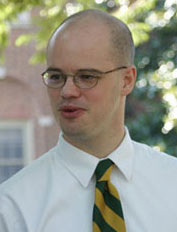No Admissions Discrimination Against Women
 Henry Broaddus, Dean of Admission at William & Mary, published the following letter in August 2007 in the Chronicle of Higher Education. It was in response to a July 2007 essay in the Chronicle regarding gender equity in the admissions process. -Ed
Henry Broaddus, Dean of Admission at William & Mary, published the following letter in August 2007 in the Chronicle of Higher Education. It was in response to a July 2007 essay in the Chronicle regarding gender equity in the admissions process. -Ed
To the Editor:
I read with interest Richard Whitmire's opinion piece about the differences in college-admissions rates for men and women, but I take umbrage at his decision to label that phenomenon as discrimination on the basis of one statistic alone ("The Latest Way to Discriminate Against Women," The Chronicle Review, July 20). Without intending to absolve admissions offices nationwide, or to excuse the political factions that Mr. Whitmire criticizes for failing to raise legitimate questions about what I agree is a matter of public interest, I do feel obliged to offer broader context for the admissions process at the College of William and Mary.
As the official who is responsible for ensuring the integrity of our admissions committee's decisions, I can say unequivocally that discrimination against women has no place whatsoever within that process. Simply put, William and Mary does not lower its admissions standards for men, and everyone we admit is deserving.
William and Mary certainly values gender balance within its student community in the same way it values a broad variety of experiences and backgrounds that contribute to the education of our undergraduates. Nonetheless, at no point in our process do we hold men, or any other subset of the applicant pool, to a different set of standards.
The only demographic criterion to which the college is beholden is the 65:35 ratio of in-state to out-of-state students, per its agreement with the Commonwealth of Virginia. In fact, that requirement contributes to the differences in admissions rates for men and women, as women comprise a larger proportion of the out-of-state cohort, which we admit at a much lower rate over all, than they do of the in-state applicants.
The self-selectivity of male applicants to the college plays a larger role. Among men admitted to William and Mary this year, the mid-50th percentile range on their combined SAT scores for math and critical reading was between 1320 and 1470, nominally higher than the same range for admitted women, which was between 1300 and 1460. Neither I nor any other member of the admissions committee believe that SAT scores are the only or best measure of academic strength. In this case, however, as a basis for comparing large groups of students for whom we have standardized data, the comparison aptly demonstrates that admitted men on average were not less qualified than admitted women.
For an illustration of self-selectivity at another institution, consider the fact that in the U.S. News & World Report data cited by Mr. Whitmire, in 2006 the Massachusetts Institute of Technology had an admit rate of 10 percent for men and 22 percent for women. ... Should the public believe that MIT's admissions office holds its female applicants to standards that are less than half as stringent as those employed for men? Of course not. Women who apply to MIT are a highly self-selected and academically capable group, despite being underrepresented within that particular applicant pool.
Similarly, the difference in admit rates for men and women at William and Mary says far more about the composition of our pool (more female applicants) than it does about the academic credentials of admitted students or the way we make our decisions. In other words, when it comes to admissions rates, the quality of the numerator matters far more than the size of the denominator. The shallowness of looking at admissions rates alone gives short shrift to the thoughtful consideration of other qualitative information that is requisite to a
holistic review process conducted responsibly.
I still look forward to Mr. Whitmire's forthcoming book about the achievement gap between boys and girls at the secondary-school level--a subject I agree warrants careful attention--and I hope he contributes more than single-statistic sensationalism to his examination of that equally complex issue.
Henry R. Broaddus Dean of Admission College of William and Mary
Williamsburg, Va.
http://chronicle.com Section: The Chronicle Review Volume 53, Issue 48, Page B13














